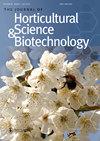Genome-wide identification of pseudo-response regulator (PRR) family members in cabbage ( Brassica oleracea var. capitata L.) and their expression in response to abiotic stress
IF 2.1
4区 农林科学
Q2 HORTICULTURE
Journal of Horticultural Science & Biotechnology
Pub Date : 2023-10-12
DOI:10.1080/14620316.2023.2263763
引用次数: 0
Abstract
ABSTRACTPRRs (pseudo-response regulators) genes play crucial roles in plant growth and development, stress response and other life activities. However, this gene family in cabbage (Brassica oleracea var. capitata L) has yet to be comprehensively studied. To fully understand the status of PRR in cabbage, ten BoPRR genes were extracted from the whole genome of cabbage through bioinformatics analysis, and their gene structure, protein conservative motifs, cis acting elements and collinearity relationships were identified and analysed. Quantitative real-time PCR (qRT-PCR) was used to explore the expression patterns of BoPRR genes in cabbage leaves under various abiotic stresses. Based on phylogenetic analysis, the ten BoPRR genes were divided into three branches, located on four chromosomes. In addition, many photoresponsive elements exist in the promoter region, and specific response elements with low temperature, drought and abscisic acid (ABA). In terms of gene expression patterns, all ten BoPRR genes were found to be expressed in cabbage leaves and showed response to abiotic stress. This study represents the first comprehensive examination of the PRR family in cabbage, providing a theoretical basis for further research on abiotic stress and offering a new gene resource for breeding stress-resistant varieties.KEYWORDS: Abiotic stressBoPRR genescabbagegenome wide analysis AcknowledgementsSJH secured the funding for the project. XYY and SJH conceived and designed the experiments.XYY and JYJ performed the experiments. XYY wrote the paper. SJH and MAR revised themanuscript. All authors read and approved the manuscript.Disclosure statementNo potential conflict of interest was reported by the authors.Data availability statementAll data generated or analysed in this study are included in the articles published here and referenced for supplementary information.Supplementary materialSupplemental data for this article can be accessed online at https://doi.org/10.1080/14620316.2023.2263763Additional informationFundingThis work was supported by the National Natural Science Foundation of China [No. 32272728, 31872108].甘蓝伪应答调节因子(PRR)家族成员的全基因组鉴定及其在非生物胁迫下的表达
【摘要】伪反应调节因子(prrs)基因在植物生长发育、逆境反应等生命活动中发挥着重要作用。然而,这个基因家族在甘蓝(芸苔甘蓝变种。capitata L)中尚未得到全面的研究。为了全面了解白菜PRR的现状,通过生物信息学分析,从白菜全基因组中提取了10个BoPRR基因,并对其基因结构、蛋白保守基序、顺式作用元件及共线性关系进行了鉴定和分析。采用实时荧光定量PCR (qRT-PCR)技术研究了不同非生物胁迫下白菜叶片BoPRR基因的表达规律。基于系统发育分析,将10个BoPRR基因分为3个分支,分别位于4条染色体上。此外,在启动子区域存在许多光响应元件,以及对低温、干旱和脱落酸(ABA)的特异性响应元件。在基因表达模式方面,10个BoPRR基因均在白菜叶片中表达,并对非生物胁迫表现出响应。本研究首次对大白菜PRR家族进行了全面研究,为进一步研究非生物胁迫提供了理论依据,并为培育抗逆性品种提供了新的基因资源。关键词:非生物胁迫boprr基因白菜全基因组分析感谢ssjh获得项目资金。XYY和SJH构思并设计了实验。XYY和JYJ进行了实验。XYY写了这篇论文。SJH和MAR对稿件进行了修改。所有作者都阅读并认可了稿件。披露声明作者未报告潜在的利益冲突。数据可用性声明本研究产生或分析的所有数据均包含在本文发表的文章中,并可作为补充信息参考。补充资料本文的补充资料可通过https://doi.org/10.1080/14620316.2023.2263763Additional info在线获取。32272728, 32272728)。
本文章由计算机程序翻译,如有差异,请以英文原文为准。
求助全文
约1分钟内获得全文
求助全文
来源期刊
CiteScore
3.90
自引率
5.30%
发文量
67
审稿时长
3 months
期刊介绍:
The Journal of Horticultural Science and Biotechnology is an international, peer-reviewed journal, which publishes original research contributions into the production, improvement and utilisation of horticultural crops. It aims to provide scientific knowledge of interest to those engaged in scientific research and the practice of horticulture. The scope of the journal includes studies on fruit and other perennial crops, vegetables and ornamentals grown in temperate or tropical regions and their use in commercial, amenity or urban horticulture. Papers, including reviews, that give new insights into plant and crop growth, yield, quality and response to the environment, are welcome, including those arising from technological innovation and developments in crop genome sequencing and other biotechnological advances.

 求助内容:
求助内容: 应助结果提醒方式:
应助结果提醒方式:


